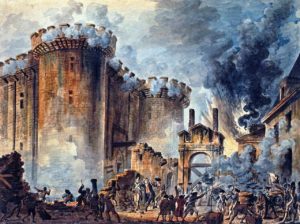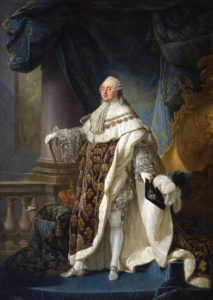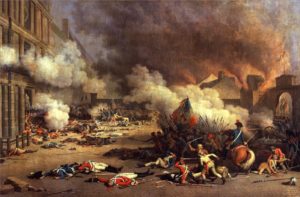
In early August 1789, the National Constituent Assembly abolished the privileges of the nobility such as personal serfdom and exclusive hunting rights. Through the Declaration of the Rights of Man and of the Citizen (27 August 1789) France established fundamental rights for men. The Declaration affirms “the natural and imprescriptible rights of man” to “liberty, property, security and resistance to oppression”. Freedom of speech and press were declared, and arbitrary arrests outlawed. It called for the destruction of aristocratic privileges and proclaimed freedom and equal rights for all men, as well as access to public office based on talent rather than birth.
In November 1789, the Assembly decided to nationalize and sell all property of the Roman Catholic Church which had been the largest landowner in the country. In July 1790, a Civil Constitution of the Clergy reorganized the French Catholic Church, cancelling the authority of the Church to levy taxes, et cetera. This fueled much discontent in parts of France, which would contribute to the civil war breaking out some years later. While King Louis XVI still enjoyed popularity among the population, his disastrous flight to Varennes (June 1791) seemed to justify rumors he had tied his hopes of political salvation to the prospects of foreign invasion. His credibility was so deeply undermined that the abolition of the monarchy and establishment of a republic became an increasing possibility.

In August 1791, the Emperor of Austria and the King of Prussia in the Declaration of Pillnitz threatened revolutionary France to intervene by force of arms to restore the French absolute monarchy. In September 1791, the National Constituent Assembly forced King Louis XVI to accept the French Constitution of 1791, thus turning the French absolute monarchy into a constitutional monarchy. In the newly established Legislative Assembly (October 1791), enmity developed and deepened between a group, later called the ‘Girondins‘, who favored war with Austria and Prussia, and a group later called ‘Montagnards‘ or ‘Jacobins‘, who opposed such a war. A majority in the Assembly in 1792 however saw a war with Austria and Prussia as a chance to boost the popularity of the revolutionary government, and thought that France would win a war against those gathered monarchies. On 20 April 1792, therefore, they declared war on Austria.
On 10 August 1792, an angry crowd threatened the palace of King Louis XVI, who took refuge in the Legislative Assembly.

A Prussian army invaded France later in August 1792. In early September, Parisians, infuriated by the Prussian army capturing Verdun and counter-revolutionary uprisings in the west of France, murdered between 1,000 and 1,500 prisoners by raiding the Parisian prisons. The Assembly and the Paris city council seemed unable to stop that bloodshed. The National Convention, chosen in the first elections under male universal suffrage, on 20 September 1792 succeeded the Legislative Assembly and on 21 September abolished the monarchy by proclaiming the French First Republic. Ex-King Louis XVI was convicted of treason and guillotined in January 1793.
